Alice's Table 60 years since the first Gibraltar Song Festival Let’s build a Centre with our songs
It was 60 years ago, this coming week – as we move into December – the third of December to be precise - when a very special event took place in Gibraltar which would capture the imagination of the population – musicians, singers, songwriters and the public in general. And which, in a very short time took Gibraltar onto the international music platform of the 1960s. Yes, it was to capture the dreams of many outside Gibraltar as well. This was the very first Gibraltar Song Festival which was held in December 1965. A fully local affair but one which would take flight across the world as composers, lyricists and arrangers landed on our shores establishing its international spread within a few years.
Historically, Gibraltar was at a crossroads - a year earlier in 1964 Gibraltarians had begun to witness the growing, ongoing increase and concern in the restrictions imposed at the frontier by General Franco’s Spain.
Fewer and fewer Gibraltarians travelled into the neighbouring country and more and more stopped going to Spain and supported all local events held on the Rock, including the Gibraltar Song Festival which would prove a major challenge, but which paid off in a big way. It very soon became one of the most popular fully supported events in the Rock’s annual calendar.
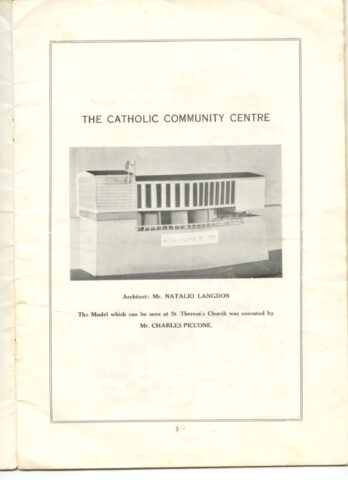
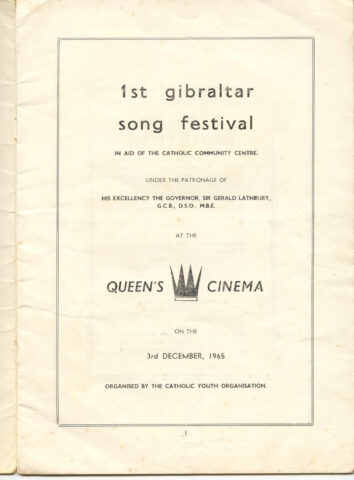
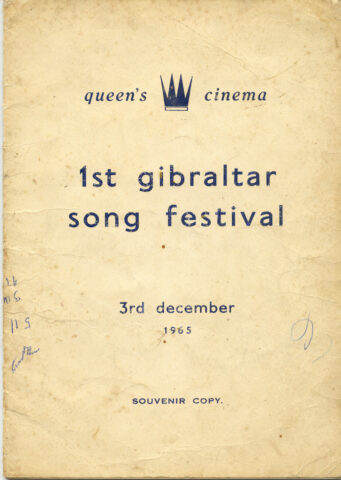
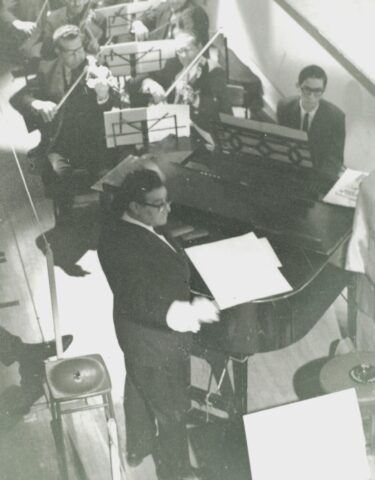
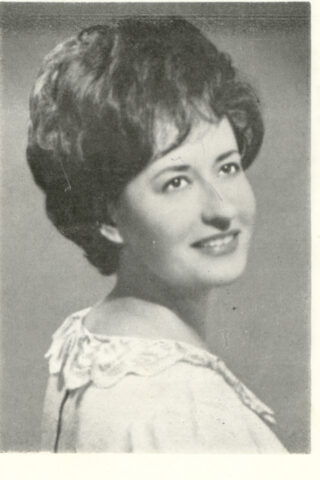
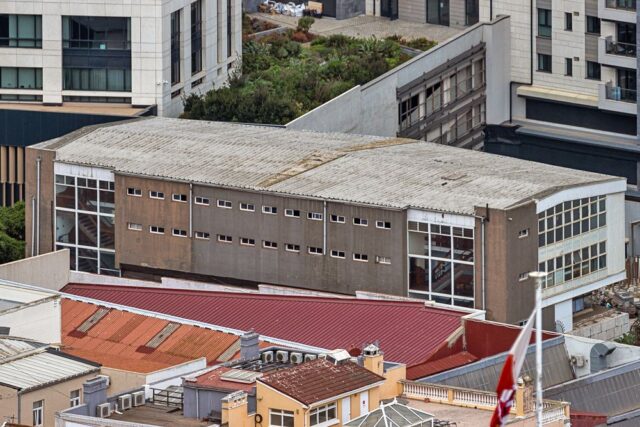
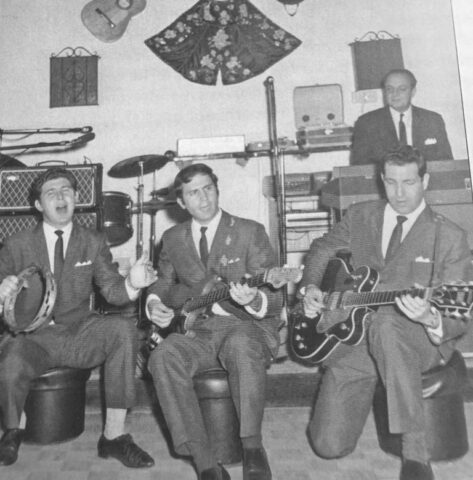
I admit, I have always had a soft spot for the Gibraltar Song Festivals, which in many ways probably influenced my interest in music – especially the local music scene – and my interest in the history of musicians, songwriters and local bands as well. My father, Manolo Mascarenhas, presented (in Spanish) all the radio broadcasts of the Gibraltar Song Festivals in those early years when they were first broadcast live over Radio Gibraltar. Then in 1970 he directed the first televised Gibraltar Song Festival from an Outside Broadcast Van outside St Michael’s Cave for GBC Television. That was the year Dorothy Squires performed the ‘Gibraltar Anthem’ Rock of Ages. But more about that in a couple of weeks’ time as we delve into the history of the festival and first look back to 60 years ago this coming week. I grew up very much aware of the festival and its songs – many of which still remain vivid in my mind even today.
So, I could not let this anniversary pass by without giving the Festival a special sitting at Alice’s Table. Already – back in 1980, when as a very young presenter I produced a Radio Gibraltar programme called MusicalRock – my main aim was to feature the Festival and speak to those involved so their stories were not lost and gone forever. These interviews and my research over the years are the basis for this article – and two more columns to come in the coming weeks.
The festival started as an idea when the Catholic Community Centre was in the making and funds had to be acquired to fully accomplish the project by the Roman Catholic Church in Gibraltar. It was one of many suggestions put to the Catholic Youth Organisation which had been created in 1959 made-up of representatives of different organisations dealing with the Apostolate. At the time organisations had no premises of their own, and with a growing membership it was getting hard to meet in the already over-used Cathedral Hall, Anglican Parish Hall, rooms at Casemates and John Mackintosh Hall. The aim was for a new Centre to meet the needs of all the organisations – with plans to build six meeting rooms, rooms for a permanent secretariat, a large auditorium for socials, conferences and concerts, a special library, reading rooms and cafeteria – a Catholic Community Centre. The building was designed by local architect Natalio Langdon (he would also design the first set for the festival in its first year). The Catholic Youth Organisation had already been fund raising for the building by holding concerts, dances, the raffling of a flat, fashion shows, bazaars, flag days – but now they were about to embark on the First Gibraltar Song Festival.
It was the late Mario Mifsud who first came up with the idea. Although not a member of the CYO, he was approached by the then Bishop of Gibraltar, Bishop Healy, to help in raising funds for the building. So, the story goes – the idea came to him whilst watching the Benidorm song festival on Spanish television. Taking his idea forward he set to work to organise the first ever local festival with a non-formal committee that would eventually take shape and be led by the late Father Charles Caruana, and whose committee members would include the late Joseph ‘Pepe’ Noguera (musician extraordinaire) and the late Francis Caruana (sax and jazzman extraordinaire).
The First Gibraltar Song Festival was held at the old Queen’s Cinema (today a car park) at 9.30pm on Saturday 3 December 1965. The dress code for that first festival in 1965 was “evening dress” and the price of the tickets – Stalls 20 shillings, 10 and 5 shillings, and in the Dress Circle 30 shillings. It was held under the patronage of the then Governor of Gibraltar General Sir Gerald Lathbury.
Even in this first year the Festival had already attracted entries from Greece, Portugal and Spain – but these songs were returned to their composers as the organisers wanted to keep it a local affair. Little did they know it would soon grow its wings and fly.
The Gibraltar Chronicle reported on the closing date for entries that 21 songs had been submitted with extra international entries. But since the Song Festival was not meant to have an “International Character” and was “strictly a competition between local composers the songs were immediately returned to their respective foreign contributors”. One week after the closing date, at the end of October that year, the panel of judges selected 10 songs for the night, and in the period leading up to the event they were orchestrated and rehearsed. The songs were first heard in Studio B in the old Radio Gibraltar Wellington Front studios. There they recorded the tunes with a skeleton band, and the judges were asked to judge them.
Well-known local musician, arranger, composer and conductor Joseph ‘Pepe’ Noguera was given the task of arranging the songs, organising and rehearsing the orchestra. He was to lead the Gibraltar Symphony Orchestra with some additional musicians at the Festival itself in the Festival Orchestra. He would also compose the signature tune for the Festival which would play annually throughout the first edition of the Festival, and which would continue until 1976. Although there were many who helped make this festival a reality – the name that always springs to mind is of former Bishop of Gibraltar Charles Caruana who took this project to heart and led with it. As a priest Father Caruana had always been a great promoter of culture and music – and he led on the organisation of the Gibraltar Song Festivals from the first edition. Recently we also read of his involvement in the creation of the Gibraltar Music Centre in the late 1960s with its premises in Sacred Heart where he was based.
That first Gibraltar Song Festival was fully supported by all musicians, the public and the local media. The newspapers gave the event their full support – before, during and after, just like Radio Gibraltar and GBC Television opened its doors to record the songs and later broadcast the event - first on Radio Gibraltar.
At that time, in musical terms, there was always something going on in Gibraltar with either musical or cultural entities. There was the Gibraltar Music Society, the Gibraltar Symphony Orchestra, the Cathedral of St Mary the Crowned and the Holy Trinity already had their own choirs. The 1950s and 1960s also saw the creation of a good number of popular bands such as Los Trovadores, The Modernaires, The Echoes, The Treks, The Diamond Boys, The Terriers, The Blue Indigos, The Mocking Birds, and many others. There was a lot happening in theatre as well with a successful Gibraltar Drama Festival (still in the hands of the military) with local participation for local drama groups such as Group 56 and St Joseph’s Drama Group. Since 1923 the Agrupacion Artistica Calpense, a music group dedicated to the performance of zarzuelas, continued to have a following. From an international perspective the Theatre Royal had over many years provided a variety of entertainment building a solid knowledgeable theatre-going crowd.
The month-long Gibraltar Festivals of the 1950s also reflected the interest in cultural and musical events where local audiences had witnessed many well-known international names perform locally - guitarist Andres Segovia, and British conductor Sir Malcolm Sargeant here for the 1950 Festival conducting the Madrid Symphony Orchestra. It was against this backdrop that the Gibraltar Song Festival was born.So, perhaps it came as no surprise that the first Gibraltar Song Festival should have received such a great response from everyone and from budding songwriters.
All song entries for the 1965 Festival had been received within a month. But even before the end of the week after the event had first been publicised, it was reported in the newspapers that the organisers had already received 10 local entries.
Musical conductor of the Festival Pepe Noguera was certainly no newcomer to the local music scene. A quiet, unassuming man, his talent was immeasurable. Musically gifted, he was a musician, composer, arranger and conductor. Pepe had played a major part in La Agrupacion Artistica Calpense. A member of the Performing Rights Society he had also written zarzuelas, marches and many songs. Here was a man whose involvement was paramount. And he took on the challenge with no questions asked.
Father Caruana in an interview on Radio Gibraltar (MusicalRock in 1980), recalled the initial meeting to formally organise the Festival and how Pepe’s reaction had been very positive. How in just a few days he had called Father Caruana to his office in the BFBS premises at Wellington Front where he worked as an engineer, to listen to what was to become the Opening Theme – “the haunting melodic overture to the Gibraltar Song Festival. Its impact was such that it would open each Song Festival over its eleven-year run. I was very encouraged by this, and I suddenly realised that the song festival was possible and I became extremely optimistic about its future.”
Pepe Noguera’s contribution was so enormous in that first year that a whole page was dedicated to the man and his “Opening Theme” in the first festival programme, and all subsequent programmes would carry similar facts.
The late Luis Diaz (whose song written with Joe Pike would win the festival that first year) also in MusicalRock paid tribute to Noguera’s contribution and recalled how he arranged all the orchestrations for all ten songs through to the final night.
And even though three of the songs were his, he nevertheless went out of his way to make a really good effort in orchestrating all the other songs as well – and which were competing against his three songs. That year rehearsals were usually held at the Parish Hall. Everyone praised his “Opening Theme”, and musician and singer in that first year, Manolo Gatt (in an interview from 2005) described it as “just fantastic” and “special too, so beautiful and a jewel of the festival” which could easily have had a place in any festival anywhere in the world.
It is important to point out that all the organisers, musicians, singers and the composers themselves were all amateurs, or at the most semi-professional.
Each song was performed twice on the night by different singers. The singers were all well known locally. Maleni Shaft (King) was the lead singer with the Modernaires, Luchi Montegriffo and Maribel Oton were both Radio Gibraltar presenters. Manolo Gatt played saxophone and sang with the Terriers; Eric Randall was a singer with the Modernaires. There was also Lewis and a very young Guy Palmer Snr. who in later years would enter his own compositions but at the time was a member of the Echoes. And Laura Monteverde who had never sung before, or at least not on stage in public. She worked as a gramophone record librarian and assistant announcer on BFBS Radio working alongside Joe Pike who had written the lyrics.
It was Luis Diaz who approached Joe Pike (they played together in the band Blue Indigo). In an interview in 2005, Joe told me how he had been unsure but still agreed to give it a try. He set about composing a number which he felt was good festival material with Louis.
“In the end we opted for the popular rhythm of slow rock, which was very fashionable at the time and which we suspected would go down well with a local audience. Since the event was being organised so near the festive season, I visualised a lyric with a Christmassy theme. I never imagined for one minute that what we would produce would win the festival,” he explained.
And that is how the song “Sounds of Christmas” was born and became the first winning song of the Gibraltar Song Festivals. The competing songs were all written in the style of the period. They were “Forevermore” penned by Peter Cardona and Francis Gomila, “Amor Peridido” by Charles Galliano, “Flores” by Lawrence Bellotti, “Gracias Bossanova” by Hector Cortes and Wilfred Marsh, “Kiss me”, “Come To Me” and “No te Olvidare” by Joseph ‘Pepe’ Noguera and A. King who was in fact Wilfred Marsh, and “Dos Claveles” and “Cruzamos” by Francis Caruana and Wilfred Marsh.
“Joe and I were absolutely thrilled when our song was announced as the winner, of course a lot of the praise must also go to Laura Monteverde, who before this I did not know could sing at all, and to Maribel Oton who had a very powerful voice and used it to great effect on the night. Pepe also did a splendid job of orchestrating the song and really managed to capture and portray the number just as I had visualised it,” Luis Diaz (interview 2005) who also formed part of the orchestra that year playing electric guitar.
My father’s news programme ‘Palabras al Viento’ of that week on Radio Gibraltar was dedicated to the Song Festival and of the winning song he wrote: “SOUNDS OF CHRISTMAS: You will agree that Luis Diaz was careful with the sounds of his Christmas imagination, whilst the lyricist chose his words with wisdom. The result is the obvious peace on earth to men of good will, which permeates the winning song.”
Runner up that first year was the song ‘Come to Me’, and third ‘No te Olvidare’ both penned by Joseph ‘Pepe’ Noguera and Wilfred Marsh.
And it was in this Palabras al Viento that my father also predicted its continued success when he said: “The applause to the winning songs, not quite extinguished, there was already talk of next year’s festival. It would have to be better than this year’s. That is Gibraltar, my small country, the smaller the greater. Always improvising, but constant. A dual success in its musical, and fundraising, aspects.”
That first year was electrifying – the Queen’s Cinema was buzzing with activity, excitement and expectation. The venue was filled to capacity -Gibraltar responded and wanted a Festival.
Everyone wanted to be a winner that night, and everyone was. This festival would create a friendly rivalry in the local music scene and they all collaborated – musicians, songwriters and organisers to create a Festival that would last and still be running in 1976. But it would not end there as other editions would be created in the 1980s, 1990s and 2000. Watch this space there is more to come as we continue to look back at the first edition of the Gibraltar Song Festival – 1965 to 1976.









